A recent surge in bed bug sightings in Paris has raised concerns about how prepared we are for a similar wave in the UK. And with tenants and landlord’s paying closer attention to their property, a few questions are coming up.
What can you do to spot the early signs of bed bugs? How do you get rid of them if your property becomes infested? And is it always a landlord’s responsibility to remove them from their rental property?
Whether your tenant has woken up with bites and thinks they’ve got a problem, or you’re looking to avoid these unwelcome guests entirely, read on to find out more.
In this article, we’ll cover the following:
Why are people suddenly concerned about bed bugs?
The bed bug infestation in Paris has been all over social media during the past couple of weeks – with numerous videos taken in the metro, hotels, and in cinemas. The videos have shown how quickly they’ve infested public spaces in such a short space of time.
And while an increase in bed bugs is typical for October in Europe, it’s been reported by Rentokil that the UK has seen a 65 per cent increase year-on-year in infestations.
And Entomologist, Jean-Michel Berenger voiced similar concerns: “every late summer, we see a big increase in bed bugs… and each year, the seasonal increase is bigger than the last one.”
It’s been speculated that a return to pre-pandemic levels of travel and the uptake in buying second hand furniture online have contributed to the outbreak.
With the problem being much closer to home, it’s good for landlord’s to know what to look for.
What do bed bugs look like?
Before you call the exterminators, it’s good to make sure you’re dealing with bed bugs and not another insect.
Bed bugs can be dark yellow, red, or brown and can be anywhere between 1.5mm to 5mm long.
You might also notice small dark spots on some furniture or on your mattress. These could be bed bug droppings, and it’s a strong indicator that you might have an infestation.

What do bed bug bites look like?
Waking up in the morning with a number of small, itchy bites is usually the first sign of bed bugs. Because they’re a blood sucking insect, these bits will normally be quite sore and grouped in a line or small patch.
How to get rid of bed bugs
Once you realise you’ve got a bed bug infestation, it’s natural to try and get rid of them straight away. Throwing away the mattress can be tempting, but you may accidentally make the issue worse by spreading them to other parts of your house.
Bed bugs are small and hard to find – so removing them completely can be tricky and you may need professional help.
Get professional help
It definitely isn’t the cheapest option but the most effective way to get rid of bed bugs for good is to use a professional exterminator.
Professional exterminators have specialist equipment that’s unavailable to the public which makes getting rid of bed bugs much more straightforward.
They’ll be able to contain the infestation and use chemicals to get rid of the bed bugs safely and effectively.
And they have the expertise to know where to look for them, so you and your tenant can have peace of mind that they’re gone for good.
But if hiring an exterminator isn’t feasible, there’s a few things you can do to get rid of the bed bugs yourself.
Find the infested areas
This is harder than you might think. You’ll usually first notice bed bugs in your mattress or a piece of furniture because you’ve woken up with bites.
But that doesn’t mean they’re only in the area you found them. Bed bugs like dark, hidden places and can be hiding in lots of different areas around a room.
When you check a room for infested areas, think about checking:
- luggage
- bedding
- box springs
- mattresses
- headboards
- under loose wallpaper
- under carpeting
- clothing
- under light switch plates or electrical outlets
Because bed bugs are only around half a centimetre in size, you’ll need to use a magnifying glass and torch to find all of them.
Contain the infested areas
This is an important step as you might accidentally spread them to a different part of your house. Resisting the urge to throw away some bed sheets, for example, keeps the infestation to one area, rather than multiple.
If your tenant tells you they’ve found bed bugs, you should encourage them to leave things where they are to stop the infestation from spreading.
Get rid of the bed bugs
Now you’ve found and contained the infested areas, it’s time to get rid of them. You’ll need to be patient, as it can take a few attempts to fully remove bed bugs, it just depends on which approach you take:
- wash on a high heat – bed bugs can’t survive in high temperatures so washing any fabrics at 60 degrees will kill them
- steam furniture – anything that can’t be put in the washing machine should be steamed at a high temperature
- freeze the fabrics – freezing temperatures will kill bed bugs, so bagging any infested fabric and putting it in the freezer for a few days will do the trick
None of these techniques are guaranteed to get rid of bed bugs entirely. And because you’ll have to interact with the infested materials to do so, there’s always a risk you’d spread it around the property.
You should avoid using pesticides or chemicals yourself as bed bugs are resistant to some and you might put your own health at risk.
Even when a professional treats an infested room it can take a few visits for it to be fully clear. So if you do decide to clear a room yourself, be prepared for it to take some time.
Is it a landlord’s responsibility to get rid of bed bugs?
This all depends on the circumstances. As a landlord, you have a responsibility to provide your tenant with somewhere safe to live but you’re not solely responsible.
When it’s a landlord’s responsibility
- if within the first few weeks of a new tenancy bed bugs are found, it’s your responsibility to get rid of them
- if it can be proved it wasn’t the tenants actions that caused the infestation
When it isn’t a landlord’s responsibility
- if the tenant has been in the property for longer than a month
- if the tenant’s actions caused the infestation
It’s sometimes difficult to determine where the responsibility lies but unless it comes at the beginning of a new tenancy, a landlord won’t be responsible for getting rid of the bed bugs.
But that doesn’t mean you shouldn’t help your tenant through the process. After all, having a happy tenant and pest-free property should be a priority.
Sharing some advice on how to contain the bed bugs and helping them get in touch with a professional will help you both get back to normality as soon as possible.
Where do bed bugs come from and how to stop them?
Understanding how bed bugs end up in your property and the kind of environment they like, is the first step to preventing them.
Bed bugs are bloodsucking insects and are attracted to the scent of humans. The reason they’re commonly found in furniture and mattresses is because they have our scent.
There are two steps you can take which could reduce your chances of having bed bugs in your property:
- check any second hand furniture for bed bugs before bringing it into the property
- limit the amount of dirty clothes and bedding in the property as the smell can attract bed bugs
Landlords should make sure tenants are following this guidance during property inspections. This will give you the best chance of avoiding bed bugs in your rental property.
More useful guides for landlords
Get set with tailored landlord cover
Over 200,000 UK landlord policies, a 9/10 customer rating and claims handled by an award-winning team. Looking to switch or start a new policy? Run a quick landlord insurance quote today.
